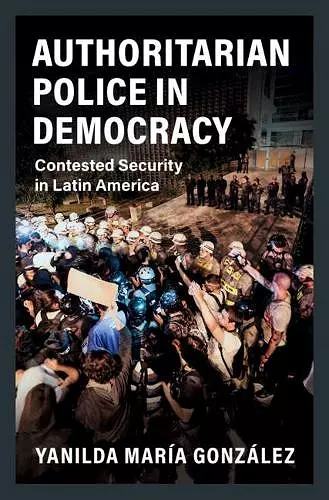Authoritarian Police in Democracy
Contested Security in Latin America
Format:Paperback
Publisher:Cambridge University Press
Published:12th Nov '20
Currently unavailable, and unfortunately no date known when it will be back
This paperback is available in another edition too:
- Hardback£99.00(9781108830393)

This book investigates the enduring issue of violent policing in democracies, particularly in Latin America, and discusses the challenges of reform.
In Authoritarian Police in Democracy, the author delves into the troubling persistence of violent and unaccountable policing within Latin American democracies. This insightful book is aimed at a wide audience, including scholars, students, educators, policymakers, journalists, advocates, and everyday citizens who share a concern for the dynamics between police forces and their communities, as well as broader issues of human rights and democracy. It sheds light on the critical need for police reform in these contexts, where the relationship between law enforcement and societal welfare is fraught with tension.
The narrative explores how police forces have become central to social unrest and the ongoing debates surrounding democracy and the rule of law across various countries, from the United States to the Philippines and Chile. By focusing specifically on Latin America, the book seeks to understand why police violence and misconduct remain prevalent even decades after the transition to democratic governance. It provides a thorough examination of the conditions that must be met for meaningful reform to take place, drawing on rich comparative analyses and evidence from Brazil, Argentina, and Colombia.
Through a careful unpacking of police bureaucracies, Authoritarian Police in Democracy reveals the intricate ways in which police forces maintain power and nurture relationships with political entities. The author argues that the persistence of authoritarian policing is not merely a relic of the past but is often reinforced by current democratic processes and public demands, highlighting the complexities of achieving genuine reform in a fragmented societal landscape.
'In this remarkable, bracing, and deeply researched book, Yanilda González goes to the heart of a question that has remained one of the most important, and underexamined questions of this century: why do the corrosive policing practices and the rampant state violence of authoritarian regimes persist after the transition to democracy? Authoritarian Police in Democracy reveals that coercive institutional arrangements are not simply holdovers of an authoritarian past, nor are they incompatible with democracy, but owe their endurance to democratic politics itself.' Vesla M. Weaver, Johns Hopkins University
'Building on remarkable and difficult field work, this book examines the presence of authoritarian modes of coercion in the midst of otherwise democratic regimes. The analysis makes sense of the intractability of violent policing in democracies - policymakers are vulnerable to the leverage of police forces, which control the means of coercion; and they most often face little pressure for reform from electorates demanding more order and security. Timely and timeless, the book offers an invaluable look into the darkest corners of many contemporary democracies.' Daniel M. Brinks, University of Texas at Austin
'Authoritarian Police in Democracy is a breakthrough book for any scholar interested in policing, security, violence, and democratic politics. González develops an original and compelling theory of authoritarian coercion in democratic regimes and traces the political challenges to police reform in three highly impressive case studies. In doing so, she powerfully illustrates how and why the distribution of repression and protection by police often reproduces social stratification, but also explains the conditions under which reform can and does occur. An extraordinary accomplishment.' Lisa L. Miller, Rutgers University
'This book lays a marvelous foundation for all scholars, policymakers, and activists who are committed to advancing this critical mission, and González should be applauded for her wisdom, erudition, and savvy in sharing both the barriers and enablers to achieving such goals.' Diane E. Davis, ReVista
'… [a] very clear, timely, and well-researched book … a must-read for academics interested in understanding the drivers of institutional change, as well as activists and policy makers focused on devising more democratic security institutions.' Lucía Tiscornia, Perspectives on Politics
'… this is a good book. González offers critical and useful insights into the so-called hard problem of police reform. … The book is not just about the demerits and problematic implications of authoritarian policing but also about how police reforms, as political processes, are either enacted or not. To have shown the path is, in my opinion, the principal achievement of the book. As police reform efforts and debates are, in my view, destined to continue in the region, González's book is by default destined to be a reference in these debates.' Carlos Vilalta, American Journal of Sociology
ISBN: 9781108820745
Dimensions: 150mm x 230mm x 25mm
Weight: 710g
376 pages